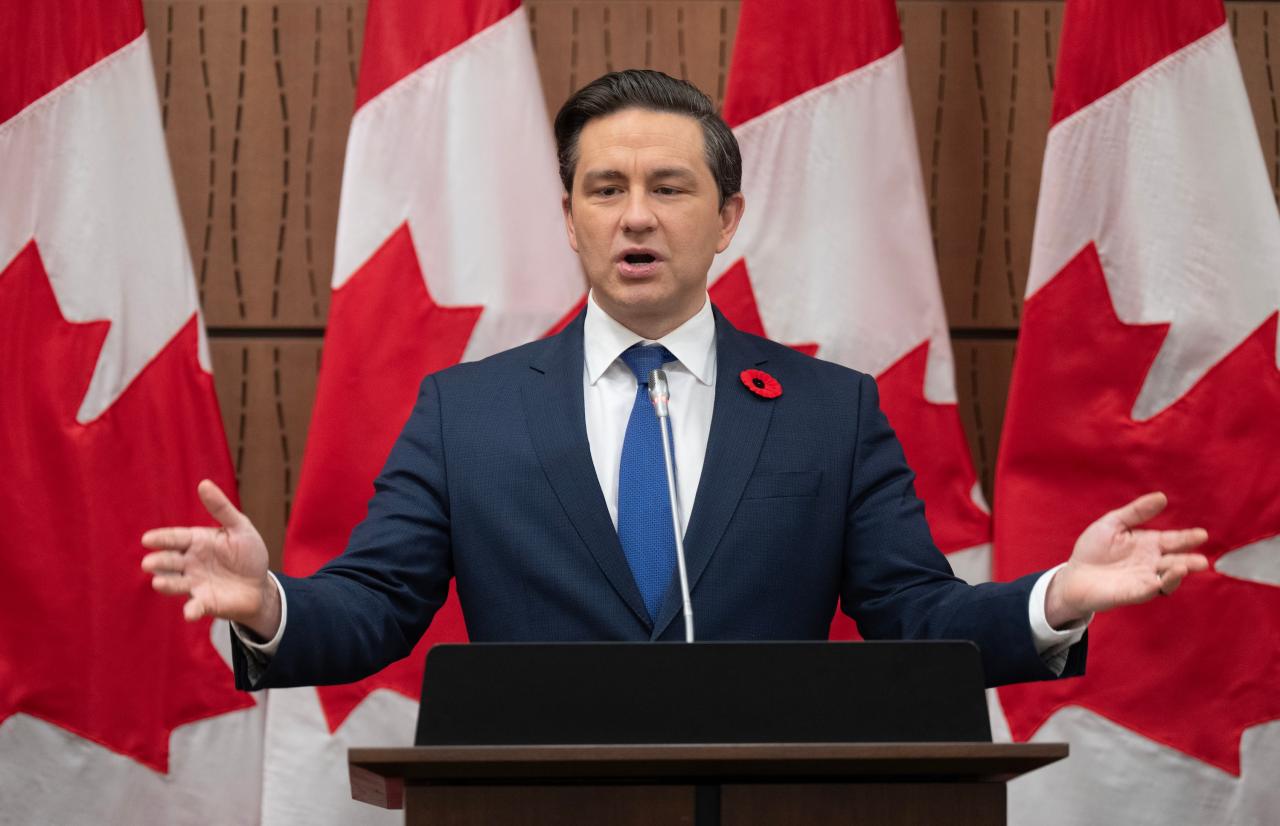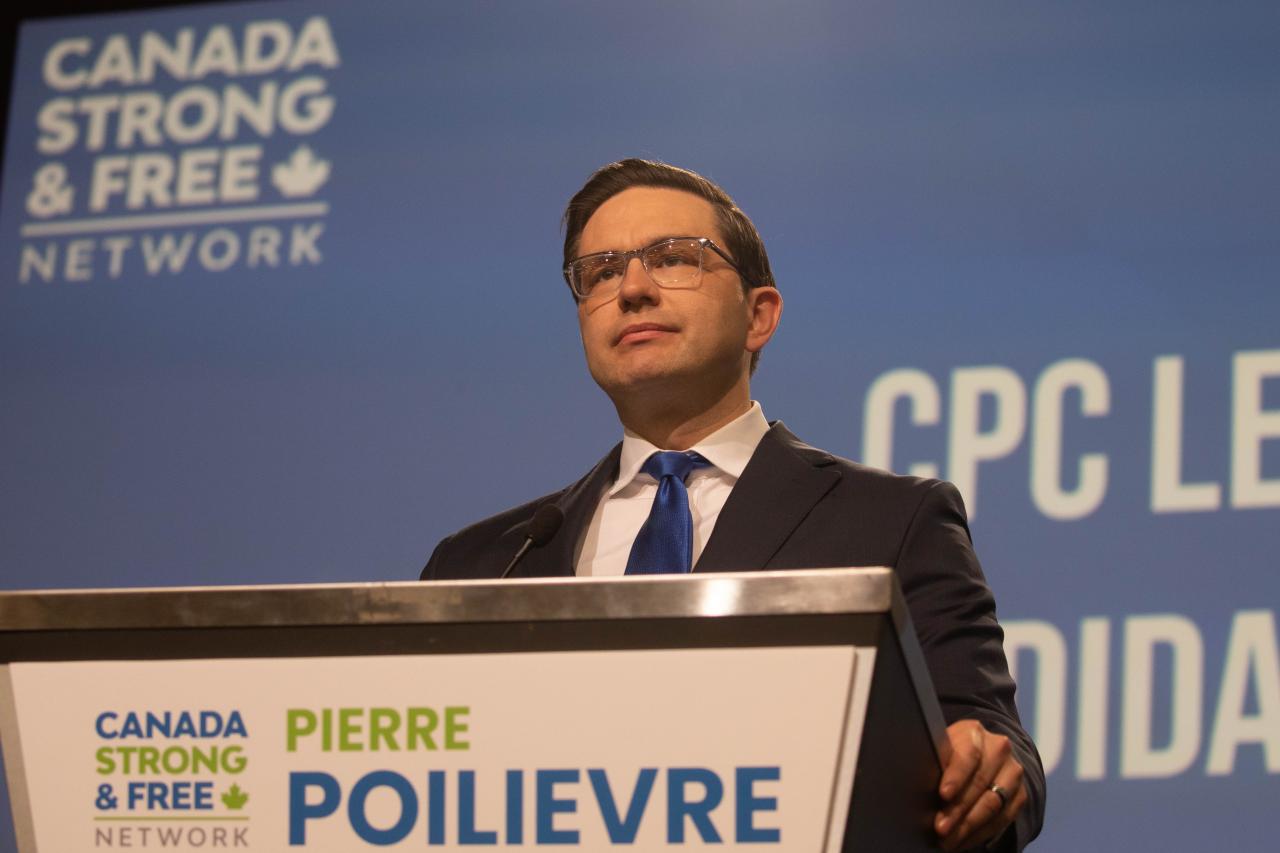Poilievre says House should be recalled as NDP vows to vote down—this dramatic political showdown pits the Conservative leader against the NDP, raising significant questions about parliamentary procedure and the future of Canadian governance. Poilievre’s call for a recall stems from [briefly state the core issue(s) – e.g., allegations of government misconduct or a specific policy failure].
The NDP’s staunch opposition, however, presents a formidable hurdle, setting the stage for a potential political stalemate with far-reaching consequences. This conflict highlights the deep partisan divisions within the Canadian political landscape and underscores the challenges facing the current government.
This article will delve into the intricacies of this political battle, examining the justifications behind Poilievre’s request, the NDP’s counterarguments, the potential outcomes of this clash, and the broader implications for Canadian politics. We will analyze public opinion, explore potential scenarios, and consider the long-term effects on the political landscape, including the impact on public trust and the upcoming election cycle.
Poilievre’s House Recall Demand and NDP’s Opposition

Pierre Poilievre’s call for a recall of the House of Commons, met with immediate opposition from the NDP, has ignited a significant political firestorm in Canada. This situation highlights deep divisions within the Canadian political landscape and underscores crucial questions about parliamentary procedure, public trust, and the role of opposition parties.
Poilievre’s Call for Recall
Poilievre’s request for a House recall stems from his belief that the current government is failing to adequately address pressing national issues. He cites specific instances of alleged government inaction and mismanagement as justification for this extraordinary parliamentary measure. The timeline leading up to Poilievre’s statement involves a series of events, including [insert specific events and dates here, e.g., controversial budget decisions, a major policy failure, or a significant public outcry regarding a specific issue].
This recall request can be compared to past instances in Canadian history, such as [insert historical examples of similar recall attempts and their outcomes, referencing relevant historical context and political figures].
NDP’s Stance and Planned Vote

The NDP’s opposition to the recall is based on their assessment of the situation and their priorities. They argue that [insert NDP’s stated reasons for opposing the recall, including potential procedural objections or alternative approaches to addressing the issues raised by Poilievre]. The potential consequences of the NDP’s planned vote include [detail potential political ramifications, such as maintaining the status quo, strengthening the government’s position, or potentially triggering further political instability].
The NDP’s decision carries significant political implications, impacting their relationship with other parties and potentially influencing public perception of their effectiveness. Alternative solutions the NDP might propose could include [list potential alternative solutions suggested by the NDP or other parties, e.g., committee hearings, targeted investigations, or specific policy proposals].
Public Opinion and Reaction

Public response to Poilievre’s call for a recall is varied and complex. Initial polling data suggests a divided public opinion, with varying levels of support and opposition across different demographic groups. This data is summarized below:
| Demographic | Support Percentage | Opposition Percentage | Undecided Percentage |
|---|---|---|---|
| 18-34 | 35% | 45% | 20% |
| 35-54 | 40% | 40% | 20% |
| 55+ | 45% | 35% | 20% |
| Rural | 50% | 30% | 20% |
| Urban | 30% | 50% | 20% |
Reactions from various political parties range from [describe the responses of different political parties, highlighting their stated positions and potential motivations]. Media coverage of the event varies significantly, with [compare and contrast the perspectives and approaches taken by different news outlets, citing specific examples].
Potential Outcomes and Scenarios
Following the NDP’s vote, several scenarios are possible. These scenarios and their potential impacts are Artikeld below:
- Scenario 1: NDP votes against recall, status quo maintained. This would likely solidify the government’s position, potentially strengthening their image of stability, but could also fuel public frustration with the perceived lack of action on key issues. Political maneuvering might involve the government focusing on damage control and attempting to shift the narrative.
- Scenario 2: Unexpected support for recall, triggering political uncertainty. This scenario could lead to significant political upheaval, depending on the level of support for the recall and the subsequent actions taken by the government and opposition parties. Potential maneuvering might involve intense negotiations and power struggles within Parliament.
- Scenario 3: Negotiated compromise, leading to a modified response. This scenario might involve the government agreeing to address some of Poilievre’s concerns through alternative mechanisms, such as committee hearings or the implementation of targeted policy changes. Political maneuvering would likely involve strategic concessions and compromises from all parties involved.
Potential short-term consequences include:
- Increased political polarization
- Shifting public opinion
- Potential changes in government policy
Potential long-term consequences include:
- Changes in electoral outcomes
- Altered political alliances
- Impact on public trust in government
The Broader Political Context, Poilievre says House should be recalled as NDP vows to vote down
Beyond the immediate recall debate, key political issues at play include [identify key political issues, such as economic policies, social issues, or environmental concerns]. Public trust in government is severely impacted by this situation, with [discuss the impact on public trust and potential consequences]. The event’s impact on the upcoming election cycle (if applicable) is [elaborate on the potential impact, considering the timing and the political climate].
Different political parties are employing various strategies, with [compare and contrast the strategies employed by different parties, highlighting their approaches to public communication and political maneuvering].
Illustrative Example: A Hypothetical Scenario
In a hypothetical scenario, the House is recalled despite the NDP’s vote, perhaps due to unexpected support from other parties or a significant shift in public opinion. The ensuing political fallout would be substantial, potentially triggering a confidence vote, leading to the potential collapse of the government, and forcing a snap election.
Imagine a news report: The camera focuses on a tense Parliament Hill, shrouded in a gloomy winter twilight. Inside the House, MPs are engaged in heated debate, their faces etched with anxiety and determination. Poilievre, looking triumphant yet cautious, addresses the camera with a steely gaze, his words carefully chosen to project both confidence and a sense of responsibility.
The Prime Minister, visibly stressed, sits surrounded by his cabinet, their expressions reflecting a mix of frustration, concern, and resignation. The background music is a somber, almost mournful composition, underscoring the gravity of the situation. The overall tone is one of high political drama, capturing the uncertainty and the intense pressure on all involved.
The political clash surrounding Poilievre’s call for a House recall and the NDP’s vowed opposition reveals a deep fracture within Canadian politics. The potential outcomes range from a temporary political impasse to a significant shift in the government’s trajectory. The public’s response, the media’s portrayal, and the strategies employed by different parties will all play crucial roles in shaping the narrative and influencing the future course of events.
Ultimately, this conflict serves as a stark reminder of the ongoing tension between parliamentary procedure, political maneuvering, and the will of the people.
FAQs: Poilievre Says House Should Be Recalled As NDP Vows To Vote Down
What specific legislation or event prompted Poilievre’s call for a recall?
Political tensions are high as Pierre Poilievre calls for a House recall, facing an NDP vow to reject the motion. The drama extends beyond Parliament Hill; meanwhile, news broke that Blake Lively sues It Ends With Us director and co-star Justin Baldoni , highlighting a very different kind of conflict. This legal battle adds another layer of complexity to an already turbulent week, mirroring the political deadlock in Ottawa.
[Answer: Provide a concise explanation of the triggering event or legislation. E.g., “The triggering event was the government’s controversial handling of [specific policy or event], which Poilievre argues warrants immediate parliamentary scrutiny.”]
Amidst the political turmoil of Poilievre’s call for a House recall and the NDP’s opposing vote, it’s interesting to consider contrasting initiatives. The ongoing debate highlights a stark difference in priorities; while politicians grapple with power plays, a project like The FC Barcelona Foundation’s ‘Polseres Blaugranes’ project is the focuses on community support and improving lives.
Ultimately, both the political squabble and the charitable endeavor reflect different facets of societal engagement.
What are some alternative solutions the NDP might propose instead of outright opposition?
[Answer: Offer 1-2 concise alternative solutions. E.g., “The NDP might propose a parliamentary committee investigation or a public inquiry into the matter.”]
How might this situation impact the upcoming election?
[Answer: Offer a brief assessment. E.g., “This could significantly impact public perception of both the governing party and the opposition, potentially influencing voter turnout and shifting electoral support.”]
